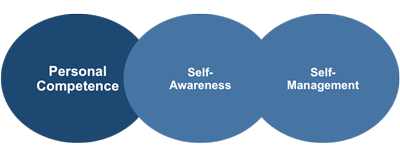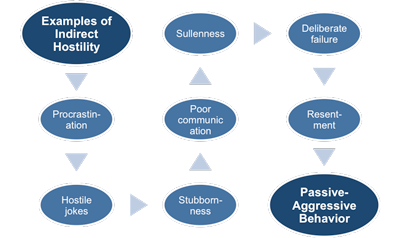Emotional Intelligence and Self-Awareness
The first area of emotional intelligence that you need to assess is personal competency. This consists of self-awareness and self-management.
 |
Self-awareness is all about recognizing and understanding how your own emotions both affect your interactions with others and impact on others' emotional state. This involves being conscious of your own emotional state, something that can be challenging for number of reasons:
Firstly, your emotions can change from one moment to the next.
Secondly, you may experience a variety of emotions at any one time.
Thirdly, the times when it is most important to be aware of your emotions are the times when you're under stress and therefore least likely to do so.
Finally, you may also have certain mental blocks and not be prepared to recognize certain emotions for what they are.
It is quite common for people to be in denial about certain emotions like anger and fear because they believe them to be a sign of weakness. Such emotions are also seen as undesirable in the organization's culture. Consequently, emotional self-awareness may be easy to understand, but it is difficult to put into practice.
You continually monitor, observe, and record the performance of your team members against their appraisal objectives. So use this same process to assess and note your own emotions and behavior. This can help you to become aware of any patterns in your emotions throughout your working day.
These notes are for your eyes only, so be completely honest with yourself. Create your own simple shorthand system for logging your feelings and your ability to control them during particular events. Your notes should detail:
• Who you interacted with and their 'relation' to you
• The topic of the interaction
• What emotions you felt
• How strongly you felt them
• Whether you could you control them.
In this way you will be able to quickly identify whether your most common emotion is positive or not. The sort of questions to ask yourself are:
Do particular people or activities cause you to feel negatively and how strong is this feeling?
Have you isolated certain events where you should have had strong feelings but didn't?
Do you feel as though you are able to keep an accurate and fair record of your emotions, and if not why not?
Also, your notes will be able to reflect your strengths and weaknesses or areas for improvement, and you can then use the reflective cycle to identify an action plan. It is key that you note both activities that could have gone better and those that went well. This way you will give yourself the same constructive and objective feedback that will build up your self-confidence.
If you feel unsure of what events to track as part of your EQ development start with those occasions where you have exhibited the particular behaviors associated with negative emotions. Instances when you displayed such emotions are easier to recall even some time after event. For example:
• Inappropriate humor or sarcasm
• Passive-aggressive behavior
• Playing the victim.
These behaviors often result from feelings of anger, frustration, or avoidance of confrontation and ignore the underlying problem. In some instances others will see such behavior as reflecting a low level of EQ because of its inappropriateness or immaturity.
If you find yourself reacting to the sarcasm of others, you need to control your instinctive reaction so that you can look beyond it to determine the underlying emotion, its causes, and implications. For example;
A member of your team may give a sarcastic reply to your enquiry as to why they are always late with their report.
By replacing your angry retort with your questioning skills you will learn that the individual feels their efforts are unrecognized, insignificant, ignored, or unappreciated.
Armed with this knowledge you can then address the underlying emotion and its implications.
Another very common negative emotion managers are likely to encounter, or exhibit, is that of passive-aggressive behavior. Such behavior becomes more prevalent the more formal a working environment is. The more formal the atmosphere the less acceptable it is to express emotions honestly.
By answering the following questions you will be able to identify such behavior in yourself and others:
Do you find yourself having a strong emotional reaction to increases in an already heavy workload, poor work quality, lack of respect, times when your credibility is questioned, etc.?
Are you resentful of, or do you oppose, others' demands?
Do you procrastinate over tasks or make intentional mistakes in response to others' demands?
Is your attitude cynical, sullen, or hostile?
The diagram below shows a variety of ways individuals can indirectly express their negative emotions or hostility.
 |
By using techniques to develop your EQ self-awareness you will be able to openly address such behaviors and their underlying emotions. If you recognize such tactics in your own behavior you need to accept that you may have a problem asserting your own thoughts and feelings, while at the same time showing appreciation and respect for someone else's viewpoint.
A common mode of behavior people display when they experience negative emotions is 'Playing the Victim'. This involves failure to take responsibility for your own circumstances. It usually begins with blaming other people for your failure to do or achieve something. This behavior prevents you from acknowledging your own shortcomings, translating into inaction.
At the heart of this emotion is usually fear. This takes two forms:
• Fear of failure prevents you taking the necessary steps to attain what you want.
• Fear that achieving the objective would not give you the payoff that you expect to get on its completion.
Certain behaviors also mask negative behavior, and assessing whether or not you exhibit them will help you identify what areas you need to focus on in order to develop your emotional intelligence. These vary from things like displacement activities (such as spending too much time on routine low-value work, where the possibility of conflict is low) to avoidance behavior (such as taking unwarranted sick days).
Look for these behaviors in your out-of-work activities in things like excessive television watching, playing computer games, engaging in social media, etc. Each of these prevents you from having to face up to your negative emotions. At their extreme behaviors can become self-destructive - for example, excessive alcohol and drug consumption.
All of these behaviors have an underlying emotional cause. Once you understand the cause you can at least begin to address it and thereby raise the level of your EQ. This also helps your manage others by heightening your appreciation of the feelings and thinking that are reflected in their behavior.
It is only by being aware of your own emotions and the impact they can have that you can hope to address them. By honestly acknowledging your emotions you can begin to perfect your emotional self-assessment skills.
Self-assessment can be conducted by yourself or by discussing your strengths and weaknesses with others. The different tools you can use to assess your EQ are discussed in detail on our free eBook 'Measuring Emotional Intelligence'.
These tools are designed to show you the areas that you are weaker in - that is, those that need developing. These aspects of your behavior are not irreparable flaws - they just show your current weak spots. Your willingness to acknowledge such blemishes, whether through self-study or by discussing them with others, is a substantial step in your EQ development.
It reflects a level of maturity in your self-confidence that is reflected in your behavior. Your decision-making becomes more decisive even in uncertain circumstances. You also have the conviction in your beliefs to stand up for what is right and to voice views that may contradict those of the organization.
This Assessing Self-Awareness Checklist provides you with a quick and easy way to assess the self-awareness aspect of emotional intelligence.
You may also be interested in:
Developing Emotional Intelligence | Self-Management | Social Awareness | Relationship Management | Emotional Intelligence, Communication, and Coaching | Emotional Intelligence, Change, Conflict, and Leadership.



